| Gemstone Chart |
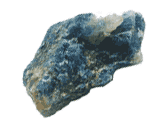 Natural Euclase Natural Euclase
Euclase is a rare mineral, resembling beryl in color and hardness.Euclase is found in granitic pegmatites with other gem minerals such as topaz and beryl.
Color: White, pale blue, greenish blue, dark blue.
Categories: semi-precious stone
Chemical Composition: BeAlSiO4(OH)
Crystal Group: Monoclinic
Refractive Index: 1.652-1.672
Hardness: 7.5
Density: 3.18
Occurrence: Brazil, Tanzania, Russia, Zimbabwe, Madagascar, Austria.
| 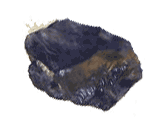 Natural Iolite Natural Iolite
Iolite is a popular and interesting gemstone, and is the gem variety of the mineral cordierite.It has also been called water sapphire because it looks very much like a blue sapphire.
Color: violet, blue, dark blue,
Categories: semi-precious stone
Chemical Composition: MG2AL4SI5O18
Crystal Group: Orthorhombic
Refractive Index: 1.53 - 1.55
Hardness: 7 - 7.5
Density: 2.57 - 2.66
Occurrence: Sri Lanka; Burma; India; Tsivory,Madagascar; Canada; Namibia; Tanzania; Norway; U.S.A.; Brazil
| 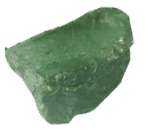 Natural Kornerupine Natural Kornerupine
Kornerupine is a rare mineral occasionally used as a gemstone. It appears frequently in parcels from Ceylon and may be confused with beryl, peridot, topaz, or quartz.
Color: Brown, brownish red, yellow-green, light green, blue green
Categories: semi-precious stone
Crystal Group: Orthorhombic
Refractive Index: 1.665 – 1.683
Hardness: 6.5
Density: 3.25 - 3.35
Occurrence: Ceylon, Tanzania
| 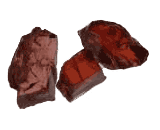 Natural Malaia Garnet Natural Malaia Garnet
Malaia garnet is a mixture of almandine, pyrope, and spessartine. It has remained the preserve of collectors for the 2 decades since it was discovered, mainly due to its extreme rarity.Tanzania is the known source for this lovely gemstone.
Color: orangey pink, champagne, orange brown, copper-pink.
Categories: semi-precious stone
Chemical Composition: [Mg3 + Mn3]AL2(SIO4)
Crystal Group: Cubic
Refractive Index: 1.73 - 1.81
Hardness: 7 - 7.5
Density: 3.65 - 4.20
Occurrence: Kenya, Tanzania, Madagascar
| 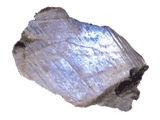 Natural Moonstone Natural Moonstone
The most common moonstone is of the mineral adularia.It is an opaque stone, a simi-clear white, kind of the color of watered down milk.Moonstone Jewellery uses the gemstone moonstone as its main stone.
Color: white, blueish white.
Categories: semi-precious stone
Chemical Composition: KalSI3O8
Crystal Group: Monoclinic
Refractive Index: 1.518 – 1.526
Hardness: 6 – 6.50
Density: 2.55 – 2.57
Occurrence: Sri Lanka, India, Madagascar, Burma, Tanzania, U.S.A.
| 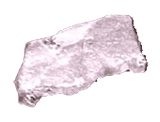 Natural Oligoclase Natural Oligoclase
Oligoclase is a rock-forming mineral belonging to the plagioclase feldspars. Oligoclase is famous for its two gem varieties: Sunstone and Moonstone.
Color: green, orange, red, colorless
Categories: semi-precious stone
Chemical Composition: [Na,Ca]AlSi3O8
Crystal Group: Triclinic
Refractive Index: 1.53 - 1.54
Hardness: 6 - 6.5
Density: 2.62 - 2.65
Occurrence: Tvedestrand and Hitero on the south coast of Norway; near Lake Baikal Russia; Ontario, Canada; Tanzania; Kangayam, southern India; France; and in Maine, New Mexico, New York, North Carolina, Pennsylvania, Virginia and Oregon in the USA.
| 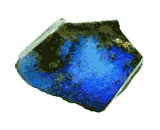 Natural Opal Natural Opal
Opal is the most colorful of all gems. It is a form of silica chemically similar to quartz, but more like glass and containing a variable amount of water within the mineral structure. Its splendid play of color is unsurpassed, and fine examples can be more valuable than diamond. Precious opals (black and white) are cut and polished into cabochons and used in all forms of jewelry.
Color: White, green, blue, black, red, orange, violet, pink, grey, yellow.
Categories: precious stone
Chemical Composition: SIO2nH2O
Crystal Group: Amorphous
Refractive Index: 1.44-1.46
Hardness: 5.5 - 6.0
Density: 2.65 - 3.00
Occurrence: Czechoslovakia, Mexico, Honduras, Australia, Brazil, Tanzania.
| 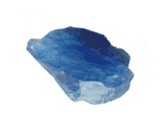 Natural Sapphire Natural Sapphire
Sapphire is a gemstone variety of the mineral corundum,Blue is the main colour of the sapphire. Its beauty, its magnificent colours, its transparency, but also its constancy and durability are qualities associated with this gemstone by gemstone lovers and specialists alike.Fancy sapphires are pure individualism and are just made for lovers of individualistic coloured stone jewellery. They are currently available in a positively enchanting variety of designs - as ring stones, necklace pendants or ear jewellery.
Color: blue, bluish purple, bluish violet, greenish yellow, orangy yellow, purple, red, reddish orange, red-orange or orange-red, reddish purple, red-purple or purple-red, slightly purplish red, violet, violetish blue, yellow, yellowish orange, pink
Categories: precious stone
Chemical Composition: AL22O3
Crystal Group: Hexagonal
Refractive Index: 1.759-1.778
Hardness: 9
Density: 4
Occurrence: Sri Lanka, Burma, India, Kenya, Tanzania, Madagascar, Thailand, U.S.A., China
|
|
